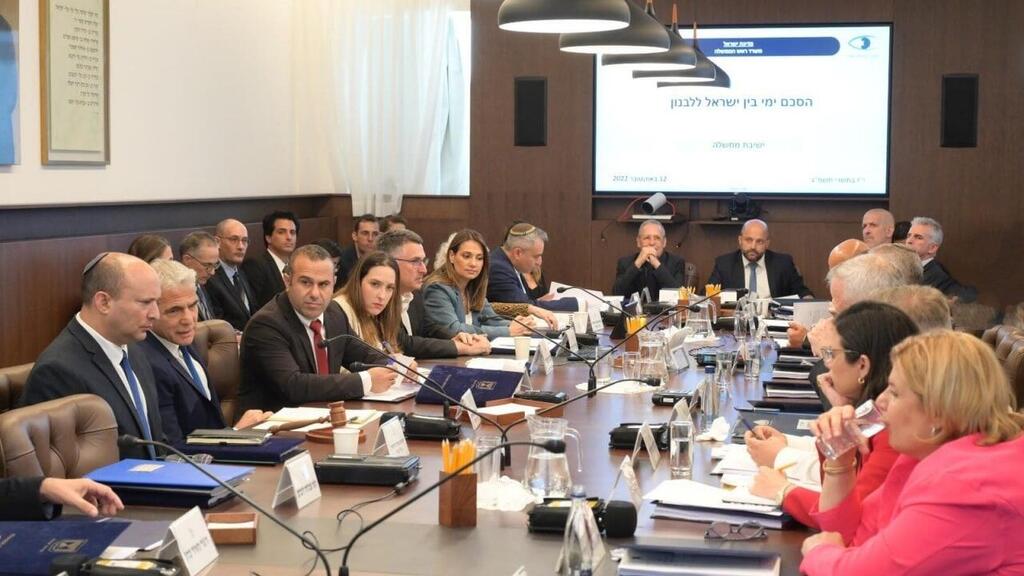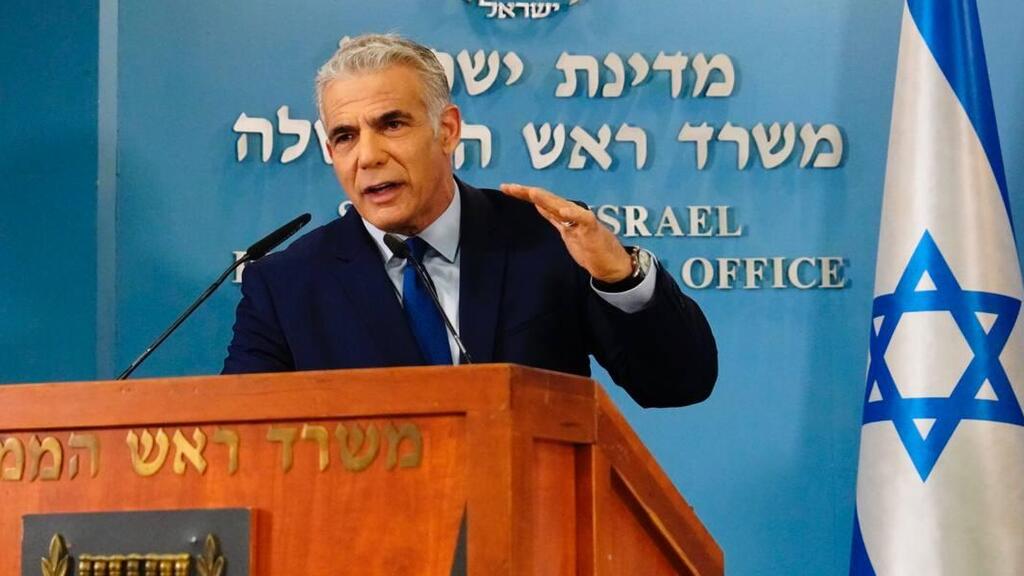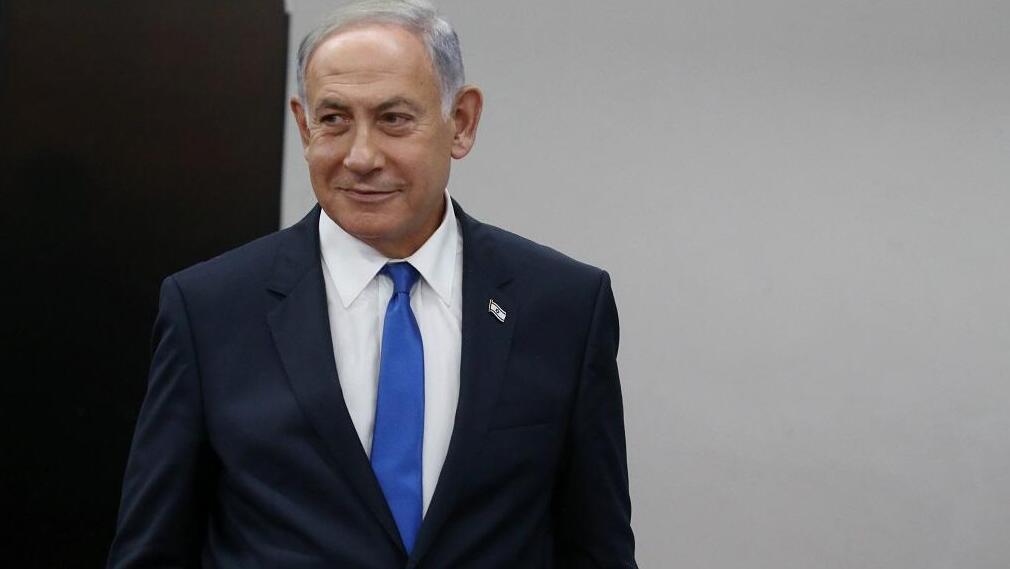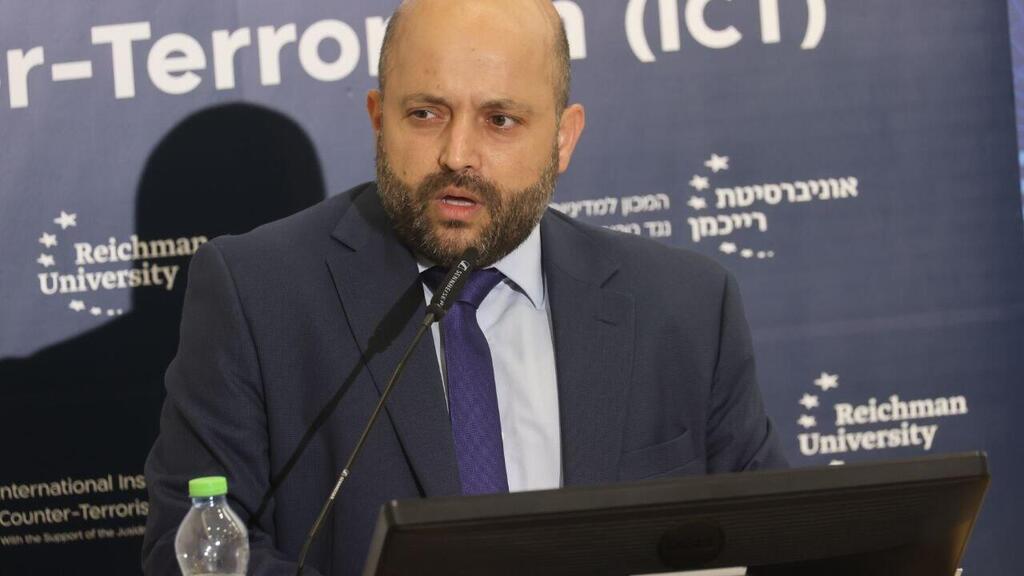Getting your Trinity Audio player ready...
Prime Minister Yair Lapid said on Wednesday the pending agreement on the maritime border with Lebanon reduces the risk of a war with the Hezbollah terror group.
Speaking at a press conference in the presence of Defense Minister Benny Gantz and Energy Minister Karin Elharar, the premier said the deal greatly improves the Israeli security.
"Israel does not fear a military conflict with Hezbollah, the IDF is stronger than any terror group, and if a war was to break out, we would deal them a major blow ... but the government's job is to avoid war," he said.
"We made clear to Lebanon that our drilling in the Karish natural gas field would not be delayed and Israel will not be deterred by any threats," the prime minister said.
"The agreement will yield an income of billions that every family in Israel will benefit from. Israel will receive 17% of all revenue from the Qana natural gas field - if and when Lebanon begins production there," he said.
The prime minister said the Knesset Foreign Affairs and Defense Committee will receive the full wording of the agreement for review, including the security clauses, and opposition leader Benjamin Netanyahu will be invited to see the agreement as well.
Lapid and Gantz both slammed Netanyahu for criticizing the government for agreeing to the deal, which he called a capitulation to Hezbollah demands.
Lapid said Netanyahu was making unfounded claims for the benefit of his election campaign, having not seen the agreement. Gantz, meanwhile, reminded the Likud leader that as prime minister, Netanyahu agreed to the terms of the Abraham Accords without revealing to his then-coalition partners the content of the agreements in advance.
Gantz said he gave his agreement to the Accords, while recovering from back surgery, because that was the right thing to do to preserve Israeli interests, something Netanyahu was refusing to do.
Lapid also said the decision to avoid a Knesset vote on the agreement came after it was clear that the opportune time to finalize the deal was before the end of October, when Lebanese President Michel Aoun would step down.
"There will likely be no opportunity in the near future, to have all three factional leaders of Lebanon in agreement at the same time," Lapid said. "I would have preferred not to have to decide on the agreement so close to an election, but the schedule was dictated by the political situation in Lebanon," Lapid said.
The premier told reporters he had discussed American assurances to Israel stipulated in the deal with U.S. President Joe Biden on Tuesday, in what he claimed was a very positive phone conversation. According to Lapid, the U.S. and Israel were still negotiating on the final wording of the assurances .
The government earlier on Wednesday approved the principles of the Lebanon maritime border agreement in a majority vote, and it was also presented to the Knesset where it could be reviewed by legislators during the next two weeks before returning to the government for a final vote.
According to the Prime Minister's Office, ministers agreed on the importance of the deal with Lebanon and its benefits to national security.
4 View gallery


Political and security cabinet convenes to discuss the maritime border agreement
(Photo: GPO)
While there was an overwhelming majority in favor of the agreement, Interior Minister Ayelet Shaked voted abstained from the vote, as did Communications Minister Yoaz Hendel.
The government was briefed by experts who presented the main principles of the new deal and its potential for stabilizing the region.
After 14-days of parliamentary review, the agreement will be submitted for final cabinet approval, in accordance with the government's work regulations and accompanied by an approval by the attorney general.
Attorney General Gali Baharav-Miara said that the government's statutes require that the agreement be reviewed by the Knesset. She said that the government has the right to decide whether it must stand a vote, but doesn't have to.
Earlier still, the security cabinet convened to give preliminary approval for the maritime border agreement between Israel and Lebanon.
This was after negotiators from the two countries on Tuesday said Lebanon and Israel received a final draft of a mediated maritime border deal from U.S. envoy Amos Hochstein and it "satisfied" all of their requirements.
National Security Council chief Eyal Hulata said in a briefing that Lebanon did not receive 100% of its demands.
"Lebanon's interests were not entirely opposed to those of Israel," Hulata said. "They wanted all of the Qana field but were denied.
"The deal goes against Iran's interest in Lebanon and weakens Hezbollah's hold on the government in Beirut. In Israel's perspective, this was a catalyst to making the deal," he said, adding that it will bolster regional security and prevent conflict with Lebanon.
Hulata noted that for the first time, Israel's territorial borders will be recognized by Lebanon and the U.S., after decades of efforts. "The agreement will bring a strategic regional stability which will allow Israel to produce natural gas without interruption," he said.
"By adding their consent, Hezbollah – motivated by their own political and economic considerations - has shifted from its previous policy to prevent the Beirut government from reaching any agreement with Israel," he said.
Hulata said Israel was looking forward to the signing of the agreement that will be in the presence of all partners to the deal on the Israel-Lebanon border at Naqoura, when both countries complete their approval processes.




